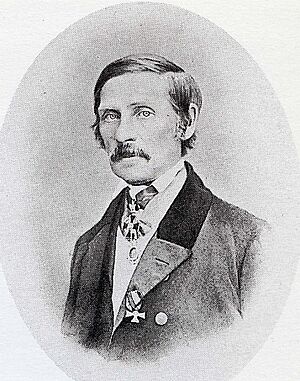Alexander von Nordmann facts for kids
Alexander von Nordmann (born May 24, 1803, in Ruotsinsalmi, now part of Kotka, Finland – died June 25, 1866, in Helsinki, Finland) was a very important Finnish biologist. He made big discoveries in many areas of science. These included zoology (the study of animals), parasitology (the study of parasites), botany (the study of plants), and paleontology (the study of fossils).
Contents
Life Story of Alexander von Nordmann
Nordmann's father was an officer in the Russian army. He lived at the Ruotsinsalmi fortress. Alexander started his university studies at the Imperial Academy of Turku in Finland. While studying, he also helped look after the insect collections there.
In 1827, he moved to Berlin to continue his studies. He worked with a famous scientist named Karl Rudolphi. Rudolphi was an expert in parasites. Nordmann's first major scientific work was about tiny worms and crustaceans. These were parasites found in the eyes and other parts of fish, animals, and even humans. One of his discoveries was a unique parasite called Diplozoon paradoxum.
Teaching and Expeditions
In 1832, Nordmann became a professor, which means a teacher, at the Lyceum Richelieu in Odessa. Odessa was in what is now Ukraine. Two years later, in 1834, he also became the director of the Odessa Botanical Garden. This garden was a place where many different plants were grown and studied. He also led a special school for gardening.
Nordmann went on several trips to collect natural specimens. He explored southern Russia and nearby areas. Later, in 1849, he moved back to Finland. He became a professor of Zoology and Botany at the Imperial Alexander University in Finland in Helsinki. He continued his important work there until he died. Alexander von Nordmann passed away on June 25, 1866, due to heart failure.
Things Named After Him
Many plants and animals have been named in honor of Alexander von Nordmann. This shows how important his work was!
- A tiny water flea called Evadne nordmanni was named after him.
- A type of fir tree, the Nordmann fir (Abies nordmanniana), also carries his name.
- At least seven other species of living things have been named after him.
- Even a whole group of plants, a genus called Nordmannia, was named to remember him.
When scientists write about plants, they often use a short name for the person who first described the plant. For Alexander von Nordmann, this short name is Nordm.
Major Scientific Books
Alexander von Nordmann wrote several important books about his scientific discoveries. These books shared his detailed observations and findings with other scientists around the world. His works covered his studies on tiny spineless animals, his travels, and ancient life forms (fossils) from southern Russia.
See Also
 In Spanish: Alexander von Nordmann para niños
In Spanish: Alexander von Nordmann para niños
 | Jackie Robinson |
 | Jack Johnson |
 | Althea Gibson |
 | Arthur Ashe |
 | Muhammad Ali |


